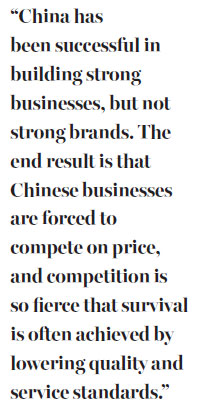Brand success not about slogans

What's needed is emphasis on feelings of friendship, trust, loyalty and provision of consistently great customer experiences
In recent decades, many global Western brands have entered the Chinese market offering superior quality products and services at premium prices. The perception of global brand superiority in terms of value for money and premium quality has become firmly established in the minds of Chinese consumers.
The Chinese middle class, with its rising spending power, has increasingly favored foreign brands that understand their needs and have successfully established emotional connections with them. Domestic brands have not been, and are not yet able to, compete with foreign competitors on these dimensions.
The skills and techniques of building and managing strong brands are almost nonexistent in China, even at the largest company level.
China has been successful in building strong businesses, but not strong brands. The end result is that Chinese businesses are forced to compete on price, and competition is so fierce that survival is often achieved by lowering quality and service standards. "Made in China" is therefore unfortunately associated with a perception of poor quality and low price in the minds of consumers across most foreign markets and domestically, leading to a lack of trust and consumer confidence.
Country-of-origin counts a lot in nurturing and changing consumer mindsets toward brands, and has played a great role in helping Western brands achieve success in China. From a public sector perspective, government at all levels should establish and manage positive images of the nation, provinces, cities and other places.

The government has been pushing to restore China's confidence as a great nation, but confidence comes with success. Creating successful domestic and global brands to augment China's rising economic power and reflect its unique identity, culture and history is the only way to change Chinese and foreign consumer mindsets. A strong national brand image helps companies go global and successful corporate brands help build national prestige.
To achieve corporate brand success the mindsets of business leaders in China need to change. They must realize that branding is not just about advertising, promotion, logos, slogans and public relations.
These are tactical, not strategic, activities and devices. Brands are strategic in nature and built around friendship, trust, loyalty, and the provision of consistently great customer experiences.
Brands differentiate themselves using human psychology to create emotional bonds with consumers, and these techniques need to be learned by Chinese businesses. In a globalized world, everything (products, systems, technology, processes, etc) can be copied. The only things that cannot be replicated by competitors are brand identity and image.
It is an unfortunate fact that China has been left behind in global brand building, and businesses must remedy this situation soon as building a brand takes time. But while CEOs are usually happy to invest in capital equipment, huge buildings, technology and other "hard" items, they are often unwilling to invest in the "soft" power of branding that can result in formidable intangible asset value. Brands should be viewed as strategic assets that provide a considerable return on investment.
On the positive side there is huge domestic potential for Chinese consumers to purchase guohuo (domestic goods), buying Chinese goods to support the economy and to feel proud of being Chinese, but they need to be attracted by emotionally driven, authentic brands they trust.
Provinces have been encouraged to help businesses build strong domestic and international brands. To fulfill this role, provincial leaders must understand how strong brands are built. Moreover, they require those skills themselves to build public sector brands and attract more visitors and investors. At the same time, business leaders need to learn in-depth, world-class brand building and management techniques.
It is quite clear that there is a great need for substantial investment in training and education programs focused on brand strategy and management at provincial and corporate levels. Government support and national branding activities will help create the brand culture needed.
As China undergoes industrial transformation to focus more on improved product quality, sustainability, and greater market share domestically and internationally, the goal of "branded in China" must be understood throughout the public and private sectors, and mindsets must change. Branding is the only effective strategy to improve China's image in the modern business world.
The author is a global expert on brand creation and an associate fellow at Oxford University's Said Business School. The views do not necessarily reflect those of China Daily.
(China Daily Africa Weekly 09/09/2016 page8)
Today's Top News
- Foreign ministers of China, Egypt call for Gaza progress
- Shield machine achieves Yangtze tunnel milestone
- Expanding domestic demand a strategic move to sustain high-quality development
- Xi hears report from Macao SAR chief executive
- Xi hears report from HKSAR chief executive
- UN envoy calls on Japan to retract Taiwan comments






























